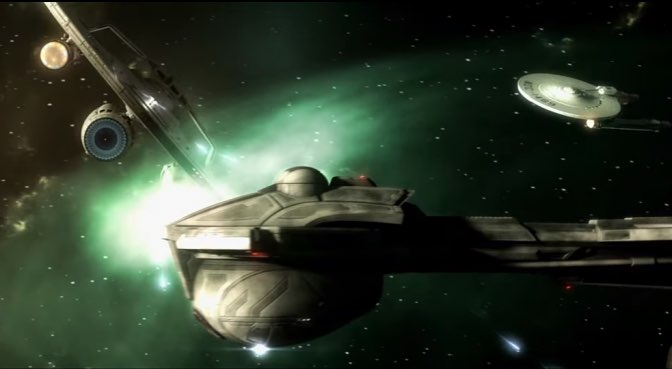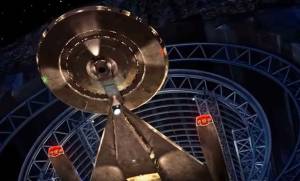Discovery-Axanar Speculation Fuels Spurious Debate
Table of Contents
Opinion

By Carlos Pedraza
AxaMonitor editor
August 25, 2016
BLOGGER AND NOVELIST Jeremy Varner wasn’t prepared for the intense response his speculation, “Discovery and Axanar,” would provoke in Star Trek fandom.
Varner’s August 15 piece observed that Star Trek: Discovery show runner Bryan Fuller “accidentally confirmed why CBS sued Axanar,”1) which proved sufficient to retweet and share across social media, drawing even more readers to Varner’s website.
Eureka! 'Discovery' Must be About Axanar
In his August piece, Varner wrote, “Bryan Fuller started talking about what [Discovery] was going to be, and a lot of people had their ‘Eureka’ moment. … A lot of people started to connect the dots and see that maybe, just maybe, Axanar was a threat to the show,”2) with Fuller’s pending exploration of the time before the Original Series (just like Axanar), and of an event referred to in TOS (just like Axanar), to which Fuller’s negative reply to whether the show would be about the Romulan War had to mean the show would treat with some other major conflict, Varner speculated:
The problem, really, is that there are very few events that happened between Enterprise and TOS which had any “discussion”. And, in fact, there were so few events worth talking about that even the interview above came down to “does it involve the Battle of Axanar?”3)
Evidence to the Contrary
NEVER MIND Fuller’s explicit statement Discovery was not going to deal with the Battle of Axanar, Varner concluded that any storyline other than the Romulan War would therefore have “to be shockingly similar in content to what Axanar was doing,’’ leaving “a lot of people … thinking Discovery is going to be about an open conflict with these guys [Klingons],” which is, of course, what Axanar was to be about.4)
« Despite Varner’s admitted speculation, Axanar supporters bestowed him with a kind of authority as they grasped for some kind of relevance. »
Isn’t it ridiculous to claim that in literally an entire galaxy, Discovery being set pre-TOS meant it had to copy Axanar? Never mind that Fuller’s “close but no cigar”5) comment could have been interpreted to mean it was about Romulans, but not about that war, or even any war at all, since Fuller only points an “event” referenced in TOS.
Theory: 'Prelude' Posed a Threat
Then one had to factor in the high quality of the short film, Prelude to Axanar, into the equation, which Varner described as an “$80,000 … proof of concept.” Never mind that Prelude actually cost $40,000 more than that. Still, Prelude was so good it led Varner to this inescapable conclusion:
That, there, was the final nail in the coffin. With the subject matters seeming to be so damn close, CBS couldn’t really afford to be outdone by a fan production.6)
This is a new variant of the “quality” theory — that Axanar was going to be so good, the studios couldn’t afford to be shown up by a bunch of upstarts — combined with the theory Discovery stole the idea behind Axanar. Varner combines this with what he cites as CBS and Paramount’s not having shut down Axanar’s million-dollar fundraising campaigns any time in the two years before filing suit.

A neat theory, except it ignores these facts:
- Bryan Fuller was hired to develop what we now know as Discovery months after the suit had already been filed.
- The leading lights of the crew behind Prelude‘s “fantastic show of … skills”7) had already been driven away by Axanar producer Alec Peters, including Prelude director Christian Gossett,8) producer Jhennifer Webberley and digital compositor Tommy Kraft.
- While CBS had announced in November 2015 its plans for a new Star Trek TV series, and then sued Axanar in December, it had signaled potential legal action months before that, back in August, when it made this statement to The Wrap about Axanar:
CBS has not authorized, sanctioned or licensed this project in any way, and this has been communicated to those involved. We continue to object to professional commercial ventures trading off our property rights and are considering further options to protect these rights.9) [emphasis added]
Betting on Whose Talent?
CREDIBLE THREAT? As for CBS being threatened by the leftover talent still behind Axanar, let’s put it this way: I’d put my money on the talent assembled by Bryan Fuller and Nicholas Meyer any day of the week ahead of Alec Peters and Robert Meyer Burnett.

Meyer, hired as a writer and producer for Discovery, helmed both Star Trek II: The Wrath of Khan (1982) and Star Trek VI: The Undiscovered Country (1991), both considered among the finest films in the franchise.
Ignoring Axanar's Commercial Ventures
Varner blithely lumped Axanar in with other fan productions (“… so long as they aren’t making a profit and aren’t doing something that negatively impacts [the original] work”)10) that had also crowdfunded. Varner ignored that CBS’ August 2015 statement, and even its eventual legal complaint against Axanar didn’t assert “profit” or crowdfunding as causes of action in the copyright infringement case. The suit does specifically allege Peters and his company of receiving a ”direct financial benefit“ from the Axanar project’s copyright infringement — “trading off our property rights.”11) Among those business ventures, Peters:
- Established Axanar Productions as a for-profit corporation in California. Look it up here.
- Used donor funds to build out a studio for commercial use beyond Axanar‘s production.
- Set up ongoing revenue streams through his “Donor Store,” peddling a full line of unlicensed merchandise, including coffee, posters, apparel, artwork, books, DVDs, Blu-rays and model kits.
- Paid himself a salary of $38,000 a year, plus his actors’ union fees of more than $3,000. Those items cost more than the entire budget of Star Trek–Horizon, a fan film that overtook Prelude with 2.5 million views in only five months; Prelude took two years to reach that level.
Suing someone who’s trying to make millions off your intellectual property strikes me as a more plausible reason to take them to court than doing so because you’re “afraid” of the unproven quality of their fan film (remember, much of the team that had pulled off Prelude was gone).
The Legality of Fan Works
In a follow-up post, ”The Legality of Fan Works,“ Varner makes much of CBS and Paramount not issuing a cease and desist (C&D letter) before filing their lawsuit. But a C&D isn’t a legal document; it has no force of law. It threatens legal action if the recipient doesn’t stop doing what the issuer objects to. But what would a C&D have accomplished? Possibly stopping production but certainly still leaving Axanar with a million bucks in the bank and that shiny new studio. No legal instrument was available to deal with those things other than filing suit.
Also, Varner ignores the extent of Axanar’s commercial operation that became clear with publication of its Annual Report in November 2015; the suit came a month later.
« I’d put my money on the talent assembled by Bryan Fuller and Nicholas Meyer any day of the week ahead of Alec Peters and Robert Meyer Burnett. »
Labyrinthine Copyright
VARNER’S SECOND post spends a lot of effort bemoaning the labyrinthine nature of copyright law but for a piece about how legal fan works might be it spends little time on the topics of fair use and transformativeness — the heart of Axanar’s presumed defense — instead focusing on cosplayers, DVRs, and those day care centers in Florida that painted Mickey Mouse and his pals on their walls, attracting the legal attention of Disney.
Never mind that the Disney case wasn’t a case. It was a C&D, and never went to court, so its outcome isn’t dispositive about copyright. Never mind that it was more likely a trademark and licensing enforcement issue than a copyright one.12) Never mind that trademarks require vigorous enforcement to maintain, while copyright does not.
Grasping for Relevance
Despite Varner’s own admission his blog post was purely speculative, it got a lot of attention from Axanar supporters who bestowed it with a kind of authority as they seemed to desperately grasp for some kind of relevance after Star Trek Beyond premiered and Discovery began to attract so much attention; meanwhile, Axanar remained ever further from production, and its case languished in discovery with little apparent progress toward a settlement as its January 2017 trial loomed ever closer. 
Keywords




